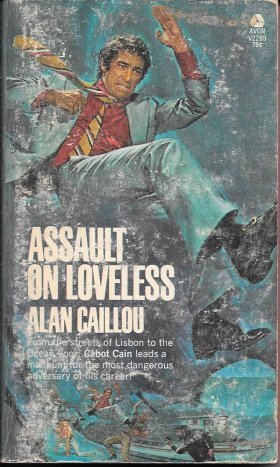Diamonds Wild
IAN QUAYLE Series
A League of Hawks
The Sword of God
DEKKER’S DEMONS Series
Suicide Run
Blood Run
The Charge of the Light Brigade
A Journey to Orassia
Rogue's Gambit
Cairo Cabal
The Prophetess
Mindanao Pearl
Joshua's People
The Cheetahs
The Hot Sun of Africa
House on Curzon Street
Rampage
The World is Six Feet Square
Khartoum
South of Khartoum
Bichu the Jaguar

ASSAULT ON LOVELESS
Book Three
Copyright 2024 Eagle One Media, Inc.
Original Copyright 1969 Alan Caillou
All Rights Reserved.
No part of this book may be copied or retransmitted without the express written permission of the publisher and copyright holder. Limited use of excerpts may be used for journalistic or review purposes. Any similarities to individuals either living or dead is purely coincidental and unintentional except where fair use laws apply.
For further information visit the Caliber Comics website: www.calibercomics.com
CHAPTER 1
The beautiful, peaceful road wound along the sandy coastline with pines on one side and the bright blue-and-white surf on the other; and we were shooting along it at a hundred and fifteen miles an hour in the Jensen, a special bodied four-seater I keep in Europe because every time I settle down to catch up on my studies—I’m very fond of the processes of learning—at home in San Francisco someone sends me a cable that says come back.
It’s an FF model, the four-wheel-drive version of the Interceptor, which isn’t a bad car either, and the model I would have bought if I hadn’t been sold on the value of four driving wheels and the unique Ferguson limited-action differential. Of course, I had to have the top cut off, since they don’t make a convertible in this model, and with a roof over my head there’s always the problem of getting in and out; I’m six feet seven, and that can be a bit of a nuisance when it comes to fast and comfortable driving. It also has the Chrysler overhead-valve mill which gives you a mere three thousand on the tachometer at seventy-five miles an hour; not that I often loiter at that speed if I can help it.
Beside me, I was conscious that Fenrek was trying hard not to show just how worried he was, and I said, with a sort of shrug: “Well, you did say hurry, didn’t you?”
“Yes, yes I did.” I knew that the line of his thin, aristocratic lips was tightening. He said: “She’s probably there by now anyway.”
He sat hunched up in the glove-leather seat, his tight frame, muscular and efficient, wedged into the bucket and his feet properly braced. Colonel Matthias Fenrek, at fifty-five years of age Interpol’s top man in Department B7, here from his Paris H.Q., on a sort of working holiday that wasn’t going to turn out to be quite as relaxing as he’d hoped. He’d been expecting to sit on the glorious beach at Estoril and do nothing, with maybe Astrid’s lithe and lovely movements to watch (keeping a watchful eye all the time on the men who were always trying so desperately to get close to her); or perhaps watching instead the gorgeous mistress he was supposed to have tucked away somewhere.
Astrid was his niece, a handsome young woman he was very fond of, twenty-seven years old and already a dammed good nurse, on leave from her New York clinic to be with her uncle on the beach for a while. Except that now, she was heading for quite the wrong beach...
I said: “The police will stop her before she can get too close.”
“You don’t know Astrid as well as I do. She can talk her way past anybody. She’ll flash her Carte Blanche at them, use my name in a hushed sort of voice, and sweep right by them all. I thought you said this car would do a hundred and fifty?”
I put a little more weight on the pedal and leaned into the wheel as the road swung gently north. We’d come from Lisbon; and Alges, Queiras, Parede, and Estoril itself had flashed past us with hardly more than a temporary slackening of speed. Cascais, the little fishing town, was gone too, in a blur of white-washed houses and tall-masted shrimp boats. The police here don’t like this kind of road racing, and who can blame them? But with Interpol beside me I wasn’t too worried; and they’d never catch the Jensen anyway, not with those six and a quarter liters under the hood.

























